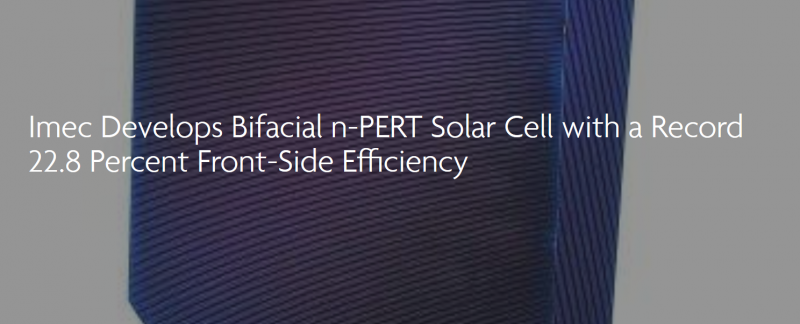Imec, the world-leading research and innovation hub in nano-electronics, energy and digital technology and partner in EnergyVille today announced it has realized bifacial n-PERT solar cells using an industrially-compatible process with a record-setting front-side conversion efficiency of 22.8 percent. Used bifacially under standard front illuminations conditions in conjunction with an additional 0.15 sun rear illumination, these cells can produce the equivalent energy of 26.2 percent monofacial cells. With a projected potential low cost-of-ownership at module level (< 0.30 $/Wp), the newly developed bifacial cell technology allows a further reduction of the levelized cost of electricity (LCOE) of large photovoltaic (PV) installations.
Featuring a transparent backside and comparable front- and back contact schemes, bifacial solar cells capture light on both sides of the cell. As a result, they also profit from indirect light, light reflected by the ground and buildings, diffuse light on overcast days, and even direct light at sunrise or sunset, incident on their rear surface. Tests indicate that, over the course of their lifetime, such cells may generate 10-40 percent more electricity than traditional monofacial cells, depending on their bifaciality, the PV installation properties and the reflection or albedo of the location. This may result in an estimated LCOE reduction for PV installations of 10 up to 30 percent.
Imec’s bifacial n-type PERT cells (Bi-PERT) have thin and narrow (< 20 µm) nickel-silver (Ni/Ag) plated fingers on both the n+ and p+ side of the cell. The cells’ contacts were fabricated in a patented process of simultaneous plating both cell sides. This cell plating is performed on cassette level (simultaneous plating on a full cassette of wafers in a chemical bath) without the need for an electrical contact to be made to the substrates. This resulted in a solar cell batch with an average conversion efficiency of 22.4 percent, with the best cell topping 22.8 percent, which is a record for this type of cell. These outcomes were measured internally, based on an ISE CalLab calibrated reference cell, with a GridTOUCH system under standard test conditions using only front side illumination and a non-reflective chuck.
Filip Duerinckx, principal engineer at imec, said: “Our Cost-of-ownership calculations indicate that this new cell technology has the potential for an exceptionally low cost-of-ownership at module level (< 0.30 $/Wp). This results from the low-cost patented metallization, the fine finger contacts, and the potential of multi-wire interconnection schemes. Especially the very limited use of silver compared to traditional screenprinted bifacial cells has a beneficial impact on the cost. As for the bifacial aspect: our cells have a near 100 percent bifaciality, which maximizes the bifacial gain. We are now working to demonstrate this technology on full 60-cell modules with wire interconnection, which we expect will reveal the full potential of this promising bifacial technology on an industrial level.”
Imec will showcase its silicon and perovskite photovoltaic technologies at SNEC, the biggest PV trade show worldwide, April 19-21, 2017 (Shanghai New Int’l Expo Center, Shanghai, China) Booth E2.573























